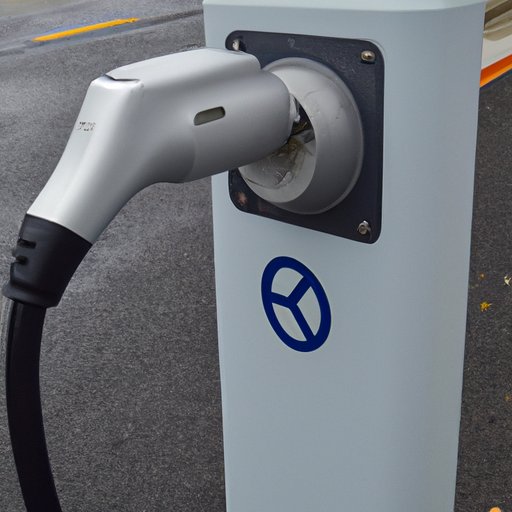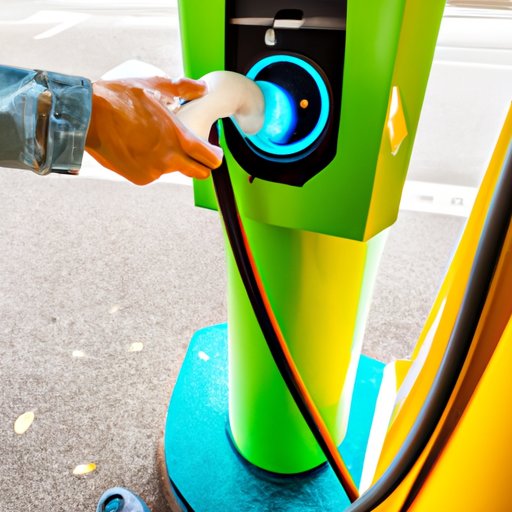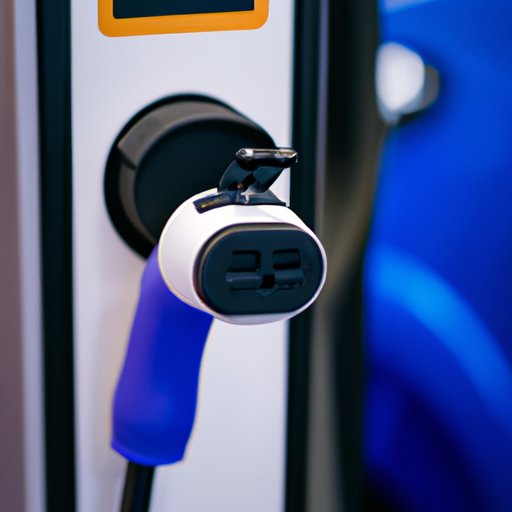Introduction
As electric vehicles become more popular, the need for electric vehicle (EV) charging stations is rapidly increasing. An EV charging station is a device that provides electricity to charge an electric vehicle battery. They come in a range of shapes, sizes, and power levels, and provide a convenient way for EV owners to recharge their batteries.
The cost of an EV charging station varies depending on several factors, such as the type of station, installation costs, and available subsidies or incentives. In this article, we’ll explore how much a charging station costs, what factors affect its price, and how to maximize your return on investment when installing one.

Analyzing the Cost of Electric Vehicle Charging Stations
The cost of an EV charging station depends on the type of station you choose and any additional installation costs. There are three main types of charging stations: Level 1, Level 2, and DC fast chargers. Each type has different features and capabilities, and thus different costs.
Level 1 charging stations are the most basic and inexpensive option. They typically connect to a standard 120-volt outlet and require 10–20 hours to fully charge an EV battery. Level 1 charging stations typically cost between $500 and $1,000, depending on the model and manufacturer.
Level 2 charging stations are more powerful than Level 1 and offer faster charging times. They use a 240-volt outlet and generally take 4–6 hours to charge an EV battery. Level 2 charging stations typically cost between $800 and $2,000, again depending on the model and manufacturer.
DC fast chargers are the most powerful type of charging station. They use a 480-volt outlet and can charge an EV battery in as little as 30 minutes. DC fast chargers are significantly more expensive than Level 1 or Level 2 charging stations, with prices ranging from $3,000 to $50,000.
In addition to the cost of the charging station itself, there may be additional installation costs associated with setting up a charging station. These costs vary depending on the complexity of the installation and whether an electrician is required. Generally, installation costs range from $500 to $1,000.
Exploring What Factors Affect the Price of a Charging Station
There are several factors that affect the price of a charging station. These include the type of station, the manufacturer, the features and capabilities, and the complexity of the installation.
The type of charging station you choose will have a major impact on the cost. As mentioned above, Level 1 charging stations are the least expensive, while DC fast chargers are the most expensive. The features and capabilities of the station will also affect the price. For example, some charging stations are equipped with WiFi connectivity, allowing users to monitor their charging remotely. Others offer more advanced features, such as automatic shut-off for safety purposes.
The manufacturer you choose will also have an effect on the price. Different manufacturers offer different levels of quality and service, so it’s important to do your research before making a purchase. Additionally, some manufacturers offer discounts or incentives for purchasing multiple charging stations.
Finally, the complexity of the installation will also affect the cost. If an electrician is required to install the charging station, then the cost will be higher. Additionally, if the installation requires special wiring or other modifications, then the cost will also increase.

Examining the Return on Investment of an Electric Vehicle Charging Station
When considering the cost of an EV charging station, it’s important to look at the potential return on investment. Installing a charging station can provide a number of benefits, such as increased convenience for EV owners and improved customer satisfaction. Additionally, some states and local governments offer subsidies and incentives to offset the cost of installing a charging station.
When comparing prices of charging stations from different manufacturers, it’s important to consider not only the upfront cost but also the long-term costs. Some manufacturers offer warranties and maintenance plans that can help reduce the cost of ownership over time.
It’s also important to investigate any subsidies or incentives available to offset the cost of installing a charging station. Many states and local governments offer rebates or tax credits for installing charging stations, so be sure to check with your local government to see what’s available.
Conclusion
The cost of an EV charging station varies depending on the type of station, the manufacturer, the features and capabilities, and the complexity of the installation. Additionally, there are a number of subsidies and incentives available to offset the cost of installing a charging station. When considering the cost of an EV charging station, it’s important to look at the potential return on investment and investigate any available subsidies or incentives.
(Note: Is this article not meeting your expectations? Do you have knowledge or insights to share? Unlock new opportunities and expand your reach by joining our authors team. Click Registration to join us and share your expertise with our readers.)
